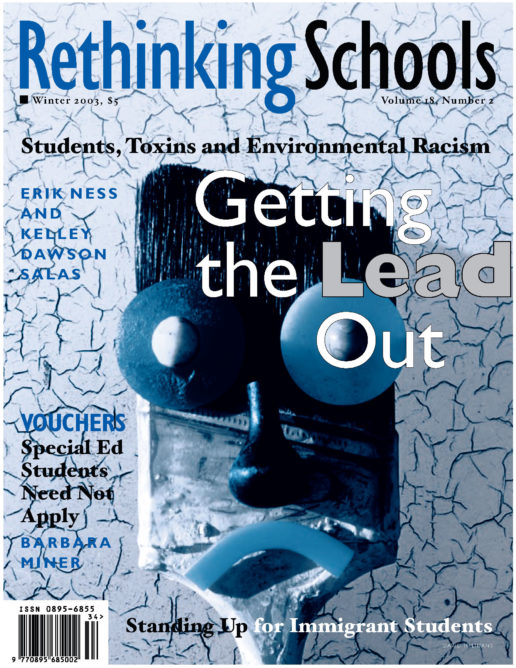Action Education: Artist Takes A Stand for Peace
Q & A with Mary K. McNeill
Mary K. McNeill has taught music to hundreds of students in the Seattle Public Schools for the past eight years. This spring, a flap over song lyrics resulted in McNeill resigning from her position as an artist-in-residence at Olympic View Elementary School.
In March, shortly after the Iraq War began, a parent complained that song lyrics McNeill taught to the students were full of anti-war rhetoric. Her principal subsequently told McNeill she could sing about peace but not sing against war or use the word “war” in a song.
And with that, McNeill, 44, packed up her guitar and left Olympic View, where she had taught for four years. The school’s PTA expressed its support for her through letter-writing campaigns and it even held an auction to raise money for her salary, but she was adamant about maintaining her position.
“I couldn’t compromise,” McNeill said. “When you talk about peace, inevitably issues of conflict arise.”
Fortunately for the school system, she still teaches at two other schools and conducts two community choirs. McNeill’s principal did not respond to messages from Rethinking Schools.
RS: What about your songs evoked so much ire from the parents who complained?
McNeill: It wasn’t just my song. I wrote the basic song (See box.) after 9/11 and had the children help me change the lyrics around so it would become more their song. The children said things like, “[W]e are kids of peace, love, friendship, justice, hope.” One boy said, “I don’t like war, I don’t want war,” and we made that a part of the song. We sang this song for a year before anyone took issue with it. That was after the Iraq War began.
RS: Were there any other instances of censorship concerning the war?
McNeill: Nothing except my posters being torn down. I do a concert outside of school called the Children’s Gathering for Peace and to promote it there were beautiful pictures of the Earth with children all around the world, holding hands, drawn by these fourth graders. The parent who complained used the posters as example of the anti-war activity [he] thought was going on.
RS: Have there been any complaints from the other schools you work with?
McNeill: Not at all. I was told that it’s district policy to teach all sides of a controversial subject and that’s what was given to me as an explanation for censoring my song, which makes me wonder why the district wouldn’t apply such rules to other schools. It seemed like such a knee-jerk reaction from Olympic View.
RS: Are you a political activist?
McNeill: I practice my activism all the time by working with the children the way I do-empowering them to raise their voices through music. One of the lines we sing [in class] is that “we can make a difference/we are the children of the world.”
RS: Was teaching peace songs a set part of your curriculum, or was it influenced by current events?
McNeill: We used to talk about peace and it was abstract in a global sense. After 9/11 and the bombing in Afghanistan, children would bring these things up in class so I shifted the focus. I asked them what we would want children around the world to know about us and what we want for them. As far as I’m concerned, it’s in keeping with the policy that we instill in our schools, which is no violence. Children are very clear that they shouldn’t resort to violence. This is what we teach them on the playground.
RS: What other projects are you working on?
McNeill: I’m definitely doing another Children’s Gathering for Peace. My dream is to start an international children’s peace and justice choir in the city. The repertoire would come from different immigrant groups who would participate. The idea is to learn each other’s music and begin to form an international community. Seattle is an amazing melting pot, so I feel like there’s good potential for that. The songs can be taught fast and will be participation-oriented because peace requires everyone’s participation.

